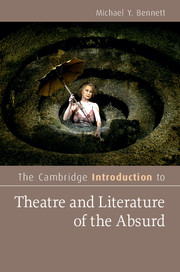Book contents
- Frontmatter
- Dedication
- Contents
- Acknowledgments
- Chapter 1 Introduction: Overview of the absurd
- Chapter 2 Setting the stage
- Chapter 3 The emergence of a “movement”: The historical and intellectual contexts
- Chapter 4 Samuel Beckett
- Chapter 5 Beckett's notable contemporaries
- Chapter 6 The European and American wave of absurdism
- Chapter 7 Post-absurdism?
- Chapter 8 Absurd criticism
- Notes
- Further reading
- Index
- Cambridge Introductions to …
Chapter 5 - Beckett's notable contemporaries
Published online by Cambridge University Press: 05 November 2015
- Frontmatter
- Dedication
- Contents
- Acknowledgments
- Chapter 1 Introduction: Overview of the absurd
- Chapter 2 Setting the stage
- Chapter 3 The emergence of a “movement”: The historical and intellectual contexts
- Chapter 4 Samuel Beckett
- Chapter 5 Beckett's notable contemporaries
- Chapter 6 The European and American wave of absurdism
- Chapter 7 Post-absurdism?
- Chapter 8 Absurd criticism
- Notes
- Further reading
- Index
- Cambridge Introductions to …
Summary
While Samuel Beckett may have been the most influential and studied writer of the group, Beckett was by no means the lone voice of the 1950s to 1970s. In fact, some of Jean Genet and Eugene Ionesco's plays preceded the theatrical debut of Beckett. While theatre was these four writers’ dominant genre, both Genet and Pinter, like Beckett, also wrote fiction and poetry. The link among them is that these four major writers are all indebted in one way or another to Beckett. However, also common to these four, is that they each influenced a whole host of future writers.
Edward Albee
Edward Franklin Albee III was born in 1928 and was adopted as a baby by wealthy parents and grew up in the affluent town of Larchmont in Westchester County, New York. His adoptive father's wealth came from his father, Edward Franklin Albee II, who made his money by owning several vaudeville theatres. This is how Albee was first acquainted with the theatre. Knowing he was gay since he was in his early teens, and never having a good relationship with his adoptive parents, Albee bounced around from school to school, getting expelled at each one. After being expelled from Trinity College in Hartford, Connecticut, he moved to Greenwich Village in New York City and wrote The Zoo Story in 1958, which quickly brought him acclaim. Since that time Albee has continued to write plays over the past six decades and has been an ardent supporter of the works of emerging American playwrights.
Maybe more so than any other writer associated with absurdism, Edward Albee has a very complex relationship with the absurd. While Esslin includes Albee as an integral absurdist in his 1961 The Theatre of the Absurd, Esslin also notes how decidedly non-absurdist Albee's plays are. In addition, Albee has publically stated Beckett and Pinter as his influences and Albee is one of the few writers associated with the absurd to directly confront and comment upon the categorization of “absurd.” In a 1962 article that appeared in The New York Times, entitled “Which Theatre is the Absurd One?” Albee, despite much skepticism, does not fully run away from the absurdist label; instead, he suggests what the absurd theatre does do and what it is.
- Type
- Chapter
- Information
- Publisher: Cambridge University PressPrint publication year: 2015

